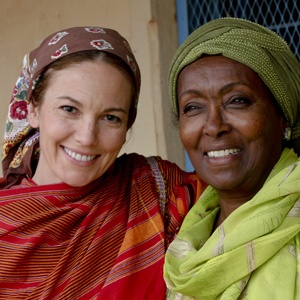My review of the Half the Sky documentary for MMW last month made little mention of any redeeming aspects of the film. On the whole, I felt that the film was sadly overshadowed by the American actresses—and George Clooney!—who accompanied and provided commentary for the Nicholas Kristof production. It became more about the celebrities than the actual women from around the world—a damning example of exactly how not to discuss the health and well-being of women from around the world.
While I still stand strongly behind the premise of my original review, I want to focus here on what I felt did work well in the film—when women were told their stories on their own terms without the visiual interference of a celebrity’s reaction. Granted, these moments were few and far between; Kristof and a celebrity were always close at hand to appear in a frame. But when those sweet, unencumbered moments occurred—where women and girls could speak on their own terms without the interference of anyone else—their stories of their challenges, overcomings, and empowerment were incredibly affecting.
http://www.youtube.com/watch?v=yy8AdCjSkx0
As I was laid up with a cold this weekend, I rewatched the portion of the film that focused on the Edna Adan Maternity Hospital in Somaliland (the film is now available in the US on Netflix streaming). The documentary shared that Somaliland, an officially unrecognized state, faces some of the highest maternal mortality rates in the world; Kristof states that there is a “one out of twelve lifetime risk of dying in childbirth” there. Women are overwhelmingly affected by their experience of female genital mutilation as girls, which lead to complications when they become pregnant and it comes time to give birth.
http://www.youtube.com/watch?v=9MYwbGG5t_U
Edna Adan’s work in Somaliland—her dedication and passion for maternal health—is rightly declared as a “force of nature.” In the film, there is a moment in Somaliland when a visiting nurse midwife from England describes the Somali women condescendingly: “Women have no say on their own bodies. Women are expendable.” This statement doesn’t come from the Somali women, and it allows for, really, no rebuttal from any Somali women. There is no acknowledgment here of the privilege she has as a Western woman practicing midwifery in Somaliland. Instead there is despair, here, and no room for any positive stories to be told by Somali women who experience their “expendability” and overcome it.

Edna Adan (right), pictured with Diane Lane. Via Half the Sky.
Adan, on the other hand, describes her own complicated experience as a girl who experienced female genital mutilation herself, went on to study nurse midwifery, and found her passion in maternal health and challenging social norms that allow female genital mutilation rites. Through her hospital, she also trains nurse midwifes to learn the skills that are necessary and increase access for women throughout the country. She is a fascinating, inspiring, and brave woman. The scenes where she appears are full of energy and her commitment to being a compassionate provider for the women and girls she meets. I would have gladly spent the entirety of the documentary hearing more about her work, lessons learned, and tangible steps a viewer might undertake following watching the film.
While watching the Somaliland segment of the film, I noticed, also, the absence of the role men had in women’s lives. Almost all of the individuals interviewed in the segment were Somali women and about their experience with childbirth or female genital mutilation; we never get to hear from men about how their lives are impacted by these events in women’s lives. The omission seems so glaring—for how on earth can a society address maternal health without working alongside men? Men’s absence from the film (with the exception of Clooney), in all of the segments, seems incredibly baffling—why would Kristof not have any examples of supportive men in the film?
Watching the Somaliland segment one more time, I noticed that it did include stories of local men who were supportive to the women around them. Adan discusses her father’s love for her and his sadness when he realizes that Adan’s mother and grandmother were responsible for her undergoing female genital mutilation as a child.
Adan also addresses the fact that FGM is not religiously sanctioned in Islam. When Muslim women are often seen as meek, submissive, and powerless, Adan turns this conventional image on its head—here is an empowered Muslim woman, empowering so many other women who go on to become midwives and have a positive impact on women’s well-being in their own country.
Again, surprisingly, I noticed the role of religion/spirituality/faith in combatting women’s oppression worldwide is rarely mentioned throughout the film—Kristof addresses oppression only in a secular context. Which for me, seems to be another glaring disconnect in how to address oppression—for many women around the world, their beliefs or faith have an underlying role in how they make sense of adversity in their lives and work to overcome it.
And then there is another beautiful moment that quickly takes place without any commentary and addresses the abovementioned omissions. There is a fleeting moment, near the end of the Somaliland segment, where Diane Lane brings a newborn to her waiting father. His joy and awe is evident as he takes his girl in his arms and whispers the call to prayer to her. That quiet, first moment—unexplained and hastily moved on from in the film— between a father and his daughter served as a reminder of some of the most beautiful and hopeful aspects of life at a time when one of the most difficult of challenges women face is overcome. As the father says, “Mashallah.”

